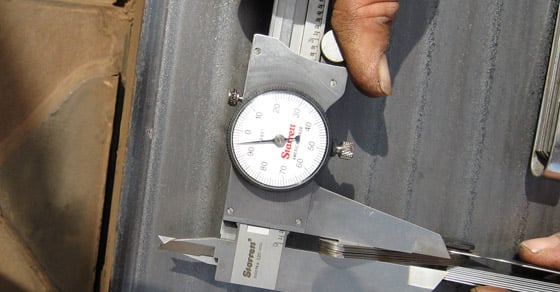Maintaining an industrial processing operation often feels like a juggling act; the needs of the equipment must be balanced with production times and output requirements. Downtime and maintenance costs must be kept to a minimum. It is here that the right parts and service support at the right time can make the difference. However, finding a provider that can serve all of your parts and service needs, no matter what brand(s) of equipment you’re working with, can be a challenge.
Many plants struggle to keep equipment efficiently maintained; equipment manufacturers go out of business, or do not provide a comprehensive maintenance program. Many will only service their own equipment, leaving facilities with few options to maintain their aging equipment and often forcing them to use a combination of providers to fit their needs.
Listed below are the services you’ll likely need throughout the lifetime of your equipment. Finding a single-source, time-tested provider that can expertly serve all of your customer service needs, whether you’re planning for a new facility, or looking to upgrade an outdated one, will not only reduce the headaches associated with maintaining an industrial processing operation, but can mean the difference between years of reliable processing with minimal downtime, and catastrophic equipment failures and lost production.
FEECO provides these services for a variety of thermal processing, agglomeration, and material handling equipment. A list of equipment serviced is provided at the end of this post.
Parts & Service Support
Replacement & Spare Parts
Replacement and spare parts are a standard component of any maintenance program.
As equipment ages, it is often necessary to replace certain components and parts, or even the entire unit; a rotary dryer may require a gear or seal replacement; a disc pelletizer, new plow blades, or a pin mixer, replacement pins.
Having a manufacturer or service provider that can keep you in stock with wear-critical spare parts, or provide replacement parts and equipment as needed is key to keeping downtime to a minimum.
Retro-fits are also often necessary. Retro-fits are an added component designed to improve the process or equipment in some way, such as the addition of a knocking system to a rotary dryer in order to decrease buildup.
Retro-fits are often a very custom solution, as they must be designed around existing process equipment and conditions. They must take into account all operating parameters, and how the new addition will affect the process.
Having a service provider with the capabilities to engineer and fabricate custom components to fit seamlessly into your process flow can be a major advantage.
Maintenance Programs
A service provider that can recommend maintenance procedures and schedules around your unique process and equipment needs is essential. It is important to set schedules and procedures in place in order to keep equipment running as it was designed and ensure key maintenance procedures are not overlooked.
Training Programs
Operators and maintenance personnel should be trained in how to safely and properly operate, inspect, and service equipment.
This will not only help to prolong equipment life, but will also aid in maintaining overall process efficiency. Trained operators are familiar with how the equipment should operate, and can spot potential signs of trouble.
Additionally, well-trained operators can often increase production and reduce off-spec material.
Finding a service provider that can thoroughly train both operators and maintenance personnel on the ins and outs of the equipment will go a long way.
Field Services
A variety of field services will also be necessary to keep your equipment running its best and should be covered by your service provider. This is likely to include:
Commissioning & Installation Support
Having a Customer Service Engineer on-site during installation is a valuable tool in ensuring your equipment is installed quickly and accurately, reducing risk of future issues due to improper or inadequate installation practices. Customer Service Engineers can provide a one-source contact for mechanical and structural procedures, allowing them to expedite scheduling and resolve issues. In addition, they can help to assure that no inspection hold points are overlooked such that warranties are voided and re-work is needed.
Alignments
Alignments are often necessary for a variety of equipment and components. This might include conveyor pulley and frame alignment or the alignment of rotary equipment such as a rotary dryer or kiln.
Alignment techniques have come a long way in the recent past; what used to be done (and sometimes still is) through manual measurements and calculations can now be carried out utilizing advanced laser tracking systems and software.
FEECO utilizes a state-of-the-art laser tracking system to perform alignments with extreme precision in significantly less time than with traditional alignment methods. This system can also perform a variety of other tasks, including elevation checks, drum shell thickness checks, 3D measurement, spatial mapping, pattern layouts (flat and circular/tubular), and even plant layouts for both new construction and existing facilities.
Tire and Trunnion Grinding
Tire and trunnion wheel grinding is a necessary maintenance procedure when working with rotary equipment such as rotary dryers and kilns. Tire and trunnion wheel surfaces naturally become worn over time, requiring resurfacing as needed. Routine resurfacing will help to keep the drum running in optimal condition and prevent further damage or strain on other components.
Annual Inspections
Annual inspections are the most cost-effective way to maintain your equipment. No matter what type of equipment you’re working with, catching the onset of potential issues is the key to preventing major damage and downtime and prolonging the life of the equipment, not to mention maintaining process efficiency.
Having an annual inspection carried out will provide a comprehensive picture of the overall health of the equipment, including items that need immediate attention, as well as things to keep an eye on.
Annual inspections also provide valuable bench-marking data and can help to predict future maintenance needs and schedules according to your unique processing conditions.
Service providers should offer annual inspections as part of a regular preventative maintenance program.
Process & Equipment Audits
Similarly, process and equipment audits are designed to assess the state of equipment and the overall efficiency of the process.
Equipment audits can be conducted on a single piece of equipment, or an entire production line. When looking for a service provider, it is especially beneficial that they have the expertise to look at your equipment not only as an individual piece, but also as a part of the larger process.
Process audits can be conducted to assess the efficiency of the operation and any potential areas for improvement.
While process audits are commonly carried out to resolve existing issues, they can also be used to assess the feasibility of changes to the process. This might include an increase in production, changes in feedstock, or an adjustment to the end product requirements.
Routine Maintenance Procedures
Depending on the equipment, there are likely a variety of other routine maintenance requirements that will be needed. This might include lifter, gear, or seal replacement on rotary equipment, tensioning, alignment, or loading on bucket elevators, or even conveyor belt alignment and training.
Additional Services
Pre-sale services
A service provider that can provide pre-sale services such as recommendations on infrastructure (electrical, fuel, water, etc.), foundational loading, and site conditions can help to guide you through the acquisition process.
Remote Support
When selected as part of a system purchase, remote support can be an invaluable part of your maintenance program. Through a secure portal, customer service engineers can gain access to the data visualization portion of your system in order to troubleshoot issues, without having to make a site visit. Having this expertise at hand often results in significant cost savings and minimized downtime.
Conclusion
Navigating the needs of an industrial processing operation and all of its components can easily become overwhelming. Finding a service provider that can assist with all of your service needs from point of sale through to routine maintenance will help to ensure your equipment continues to operate reliably for years to come.
FEECO has been providing world-class parts and service support since 1951. Our highly experienced Customer Service Engineers have the knowledge and experience to assist in all of your service needs, from installation support to annual inspections and custom retro-fits, and everything in between.
No matter what brand of equipment you have, the FEECO Customer Service Team can act as an extension of your maintenance department. We service the following types of equipment and systems:
Agglomeration:
Agglomerators
Granulation Drums
Disc Pelletizers
Pin Mixers
Pug Mills
Hammer Mills
Thermal Processing
Rotary Dryers
Rotary Coolers
Indirect Rotary Coolers (Indirect Water Deluge)
Direct-Fired Rotary Kilns
Indirect-Fired Rotary Kilns
Material Handling
Belt Conveyors & Conveyor Systems
Reversing Shuttle Conveyors
Steep Incline Conveyors
Belt Feeders
Belt Trippers
Belt Plows
For more information on any of our parts & service offerings, contact us today!



